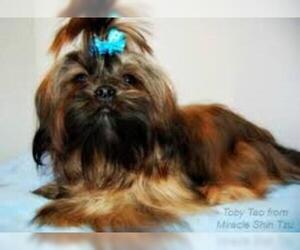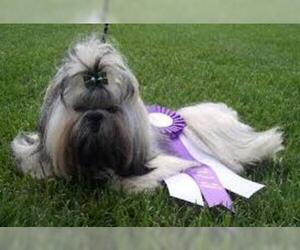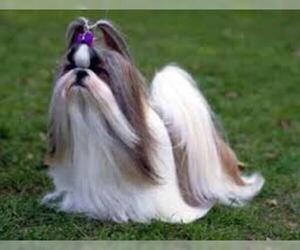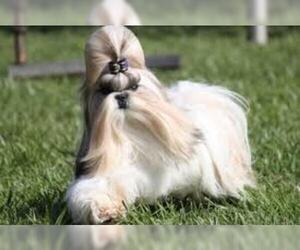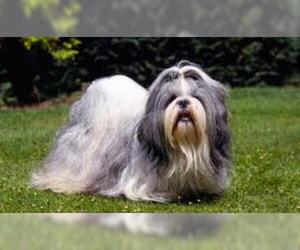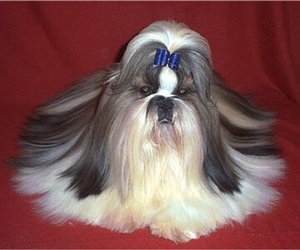
All about Shih Tzu dog breed
A.K.A. :Lion Dog, Chrysanthemum Dog, Foo Dog, Xi Shi dog, Tibetan Temple Dog, Chinese Imperial Dog, Lhasa Lion Dog, Shitzu, Schipperke, Tzu, Shih Tzu Kou, Kou
Size
Grooming requirements
Exercise requirements
Good with other dogs
Watchdog ability
Energetic
Training requirements
Playful
Affectionate
Good with other pets
Good with children
Good with strangers
Winter
Summer
Healthiness
Protective
Life Span
| Pure Breeds | Member |
| Breeds A - Z | S |
| Breeds by Group | Companion Toy |
| Breeds by Trait | Good With Kids Hypoallergenic Low Shedding |
| Overview: | The Shih Tzu, affectionately known as the "lion dog," boasts an ancient and regal lineage, originating from the Tibetan plateau and further refined in imperial China. These charming canines are easily recognized by their striking appearance: a small, sturdy build, a distinctive undershot jaw, and a long, flowing double coat that often requires regular grooming to prevent matting. Temperamentally, Shih Tzus are renowned for being affectionate, outgoing, and playful companions, making them wonderfully suitable for a variety of households. Their adaptable and generally good-natured disposition means they often thrive in families with children and are particularly well-suited for apartment living due to their modest exercise requirements. While generally robust, potential owners should be aware of common breed-specific health concerns, including respiratory issues (due to their brachycephalic, or "smushed" face), eye conditions, and luxating patella. Despite these considerations, a Shih Tzu typically brings immense joy and companionship to their devoted owners. |
F.A.Q.
All You Need to Know About the Shih Tzu Breed
The Shih Tzu, originating from Tibetan monasteries and revered by Chinese royalty, is a charming and affectionate companion. Known for their luscious, flowing coat and distinctive "chrysanthemum" face, these small but sturdy dogs typically weigh between 9-16 pounds. Their temperament is delightful: playful, outgoing, and incredibly loving, making them excellent family pets and ideal for first-time owners. They adapt wonderfully to apartment living due to their moderate exercise needs – a short daily walk or indoor play is usually sufficient. However, their beautiful double coat requires regular, often daily, grooming to prevent matting. Common health considerations include eye issues (like cataracts or dry eye) and respiratory problems (due to their brachycephalic, or "smushed" face). With proper care, a Shih Tzu brings immense joy and devotion to any home.The average weight of a Shih Tzu is between 9 to 16 pounds (4.1 to 7.3 kg).
Healthy weight for Shih Tzu adults typically falls within this range. While there isn't a significant difference, males may sometimes be slightly heavier than females, but both sexes generally adhere to this standard. This Shih Tzu weight range indicates the typical average size for a well-bred and healthy adult.Wondering about the Shih Tzu height or how tall is a Shih Tzu? These charming companions are known for their compact size, making them ideal for various living situations.
The average height of a Shih Tzu typically ranges from 9 to 10.5 inches (22.8 to 26.7 cm) when measured at the shoulder. This measurement, taken from the ground to the top of their shoulder blades, represents the standard adult Shih Tzu size.While this is the general guideline, there can be slight variations. Factors such as individual genetics and a dog's lineage can influence their final height. However, within the breed standard, you'll find most Shih Tzus falling within this comfortable range. Generally, there isn't a significant difference in height between male and female Shih Tzus; both genders typically adhere to the same breed standard for height.So, when you're looking for an adult Shih Tzu, expect a small, sturdy companion standing approximately 9 to 10.5 inches tall at the shoulder.Shih Tzu Colors: Shih Tzus boast a wide array of beautiful coat colors, making each dog unique. AKC recognized Shih Tzu colors include black, white, gold, silver, red, blue, brindle, cream, and various combinations such as black and white, gold and white, and red and white. Parti-colors, with a base color and white markings, are very common and highly sought after.Beyond these traditional hues, you'll find rare coat types and exotic Shih Tzu variations that are not officially recognized by all major kennel clubs like the AKC but are increasingly popular among breeders and owners. These include solid liver (chocolate), blue, lilac, and merle. While stunning, it's important to note that the merle pattern can be associated with certain health considerations, and these rare Shih Tzu colors may command a higher price due to their uniqueness. When considering a Shih Tzu, researching the breeder and understanding the genetics behind these less common colors is always recommended.
The Shih Tzu personality is generally outgoing, affectionate, and charming. Known for their friendly disposition, they are devoted companions who thrive on human interaction. This breed exhibits a loving loyalty to their families, often following their owners from room to room. Their sociable nature makes them adaptable to various environments, excelling as apartment dogs due to their smaller size and moderate exercise needs.Regarding temperament of Shih Tzu with others, they are typically good with well-behaved children, though supervision is always recommended due to their delicate size. With proper introductions, they usually get along well with other pets. While playful, they are not overly demanding and enjoy a comfortable, pampered lifestyle. Expect a confident and sometimes a touch stubborn character, but one that is ultimately gentle and eager to please.
The Shih Tzu temperament is renowned for being affectionate, outgoing, and charming, making them exceptional companion dogs. They are highly sociable and thrive on human interaction, displaying great friendliness towards strangers and a deep loyalty to their families. Their adaptable nature makes them ideal for apartment living, as they are generally content with indoor activities and short walks. When it comes to children, Shih Tzus are typically good-natured and patient, especially if properly socialized from a young age, though supervision is always recommended with very young children due to their small size. They also tend to get along well with other pets in the household. While generally eager to please, Shih Tzus can exhibit a charmingly stubborn streak at times, and they are quite sensitive to their owners' emotions, responding best to positive reinforcement training methods. Their endearing personality traits make them beloved members of any family.
Shih Tzu Care: Your Guide to a Happy, Healthy CompanionShih Tzu care involves consistent, gentle attention. These low-energy dog breed companions thrive with proper daily maintenance.Grooming Needs: Expect significant grooming. Their long, flowing coat requires daily brushing to prevent mats and tangles. Many owners opt for professional grooming every 4-8 weeks, often choosing a "puppy cut" for easier management. Regular nail trims (every 2-4 weeks) and professional dental cleanings are crucial.Exercise Limitations: Shih Tzus are a low-energy dog breed requiring minimal exercise. Short daily walks and indoor playtime are sufficient. Over-exertion, especially in warm weather, can be dangerous due to their brachycephalic (short-nosed) anatomy.Dietary Considerations: Feed a high-quality, age-appropriate small-breed dog food. Weight management is vital as Shih Tzus are prone to obesity, which exacerbates health issues. Follow feeding guidelines and avoid overfeeding treats.Specialized Cleaning: Due to their facial folds, wrinkle and ear cleaning are essential. Gently clean facial wrinkles daily to prevent skin infections and irritation. Check and clean their ears weekly to prevent wax buildup and ear infections.Climate Sensitivity: Their brachycephalic nature makes them highly sensitive to heat. How to care for a Shih Tzu in warm climates includes avoiding outdoor activity during peak heat, providing ample shade and water, and ensuring air conditioning. They can also get chilled easily in cold weather, so sweaters or coats are recommended.Common Health Concerns & Health Tips for Shih Tzu: Be aware of potential skin issues (due to allergies or poor grooming), dental care needs (prone to dental disease), and eye problems (such as dry eye). Regular veterinary check-ups are key to early detection and preventative health tips for Shih Tzu.
Shih Tzu Activity Level: How Active Are Shih Tzu?The Shih Tzu activity level is generally low to moderate, making them well-suited for a variety of households. While they enjoy short bursts of play and exploration, they are equally content with long periods of rest and cuddles.Energy Levels & Exercise Needs: Shih Tzu possess a charming balance of playful energy and a calm demeanor. Their exercise needs are minimal, typically fulfilled by 15-30 minutes of gentle activity per day. This can include a short walk around the block, supervised playtime in a securely fenced yard, or indoor games. Owners should be mindful of their small size and the potential for overexertion.Playtime Preferences: These affectionate dogs love interactive playtime with their human companions. They enjoy chasing soft toys, playing gentle tug-of-war, and engaging in short bouts of zoomies around the house. Their adaptable nature means they're happy to tailor their play to your pace.Brachycephalic Considerations: Due to their brachycephalic (short-nosed) anatomy, Shih Tzu are prone to respiratory issues, especially in hot or humid weather, or during strenuous exercise. It's crucial to limit their activity during peak heat and always provide fresh water and a cool resting spot. Watch for signs of overheating, such as excessive panting or lethargy. They are not suitable for high-impact activities or long-distance running.Suitability for Households: Shih Tzu are perfect for low-energy households, seniors, or apartment dwellers due to their modest exercise needs. While they can certainly bring joy to an active family, their inherent limitations mean they won't be joining you on marathons or intense hikes. They are a delightful companion for those seeking a loving, relatively low-maintenance furry friend who thrives on companionship and gentle activity.
Breed Breakdown: What Experts Say About the Shih Tzu
I would rate the "Size" trait of the Shih Tzu breed as a 2 out of 10.They are an exceptionally small breed, typically weighing between 9 to 16 pounds and standing only 9 to 10.5 inches tall at the shoulder. Their compact, sturdy build belies their small stature. Compared to most other companion dogs, even other small breeds, the Shih Tzu consistently falls on the lower end of the size spectrum. This very small size makes them incredibly well-suited for apartment living, frequent travel, and households with limited space. Their ability to fit comfortably in small environments is one of their defining characteristics.
I would rate the grooming requirements of a Shih Tzu a 9 out of 10.While they are generally low-shedding, their long, flowing double coat is extremely high-maintenance and requires daily brushing to prevent matting, which can quickly lead to painful skin infections. Many Shih Tzu owners opt for professional grooming every 4-6 weeks to maintain a shorter, more manageable "puppy cut." Beyond the coat, their brachycephalic (flat-faced) structure necessitates regular cleaning of facial folds to prevent irritation and infection. Their long, floppy ears also require frequent cleaning to avoid ear infections, and their fast-growing nails need weekly or bi-weekly trimming. Given their long hair and proximity to the ground, they also require frequent bathing to keep their coat clean, and they are somewhat susceptible to skin allergies that can manifest in skin irritation requiring specialized care. Compared to most other companion dogs, the Shih Tzu demands significantly more frequent and specialized grooming efforts to keep them healthy and comfortable.
I would rate the Shih Tzu's "Exercise Requirements" at a 2.This breed has very low exercise needs, making them an excellent choice for individuals or families with a less active lifestyle. Their brachycephalic (short-nosed) anatomy significantly limits their ability to tolerate sustained or vigorous movement, especially in warm weather, as they are prone to overheating and respiratory distress. Daily activity recommendations typically involve short, leisurely walks – perhaps 15-20 minutes once or twice a day – and some indoor playtime. They are not built for long hikes, jogging, or high-impact activities like agility. Their energy levels are generally low to moderate, and they are quite content with lounging and being a lapdog. While some playful bursts are common, they quickly tire. They thrive with minimal activity, primarily needing short bursts of engagement to stay healthy and mentally stimulated, rather than requiring structured, strenuous routines.
I'd rate the Shih Tzu's "Watchdog Ability" at a 6. They are surprisingly alert for their size and often have a keen awareness of their surroundings. Their primary watchdog function comes from their very reliable barking behavior. If someone approaches the door, an unfamiliar car pulls up, or even if a squirrel dares to cross the lawn, a Shih Tzu is likely to let you know with a series of barks. This makes them excellent "early warning systems," effectively communicating that something is amiss. However, their willingness to truly "deter" an intruder is quite low. While they'll bark up a storm, their small size and generally sweet, companionable nature mean they're unlikely to follow through with any aggressive or protective actions beyond the initial vocalization. They're more of a passive alarm system than a active deterrent, capable of providing meaningful early warnings but not much more.
I would rate the "Good with Other Dogs" trait of the Shih Tzu breed a 7 out of 10.While generally considered amiable and not inherently aggressive, Shih Tzus aren't typically the type to immediately bound up to any new dog they meet with unrestrained joy. They are often described as having a "big dog in a small body" personality, which can sometimes manifest as a charming confidence or, on occasion, a surprising assertiveness, especially if they haven't been adequately socialized. They can be perfectly compatible with other dogs, even those of different sizes and energy levels, but their success often hinges on proper early socialization. Without it, they might be reserved, a bit yappy, or even show a touch of bossiness to larger, more boisterous dogs who don't respect their personal space. They thrive in multi-dog households where introductions are handled thoughtfully, and they've learned appropriate canine social etiquette. They aren't typically prone to outright aggression, but they will stand their ground if they feel threatened or unfairly challenged. Therefore, while generally sociable, they benefit significantly from careful introductions and ongoing positive reinforcement to ensure they remain peaceful and happy in canine company.
I'd rate the "Energetic" trait of the Shih Tzu breed a 3 out of 10. Shih Tzus are decidedly low to moderate energy dogs, naturally more laid-back than active. Their typical activity level involves short bursts of play followed by extensive lounging. While they can be playful, their endurance is quite limited, and they have a low need for intense physical stimulation. Their brachycephalic anatomy significantly affects their stamina and exercise tolerance, making them prone to overheating and respiratory distress with strenuous activity. Consequently, they are not well-suited for outdoor or athletic activities, preferring gentle walks and indoor play.
I would rate the "Training Requirements" of the Shih Tzu breed as a 6.While Shih Tzus are intelligent and generally eager to please their owners, they can also possess a stubborn streak and a relatively short attention span, especially as puppies. Their responsiveness to commands can be a bit inconsistent; they may understand what you want but choose to follow only if they're in the mood or see a clear reward. This means they require significant consistency and patience from their owners. Positive reinforcement, particularly with high-value treats and praise, is highly effective and crucial for successful training, as harsh methods will only make them shut down. They are not highly demanding in terms of complex commands or advanced obedience, but house-training and basic manners can take longer than with some other breeds.For these reasons, the Shih Tzu is moderately beginner-friendly but does benefit from an owner who is committed to structured, consistent routines and understands the importance of positive reinforcement. They might not require experienced handling in the sense of a high-drive working dog, but an owner who has some experience with dog training or is willing to dedicate significant time and effort to learn effective methods will find more success than a completely novice owner expecting instant results.
I would rate the "Playful" trait of the Shih Tzu breed as a 7.Shih Tzus are definitely not inactive; they possess a charming and often amusing playfulness that can surprise those who only see them as lapdogs. They absolutely love games and interaction, particularly with their beloved human companions, often initiating play with a wagging tail and a happy bark. Their attention-seeking behavior is quite high, as they thrive on being the center of attention and will use their captivating expressions and little antics to get you to engage with them. They generally respond very well to toys, especially those they can carry or gently "kill," and their enthusiasm during playtime is palpable, often involving zoomies and joyful wiggles. While they aren't the most high-octane breed compared to, say, a Jack Russell Terrier, their overall enthusiasm in daily life is consistent and heartwarming. They are naturally spirited and enjoy being involved in household activities, but their play sessions tend to be in bursts rather than extended periods, and they are equally content to snuggle. They are more laid-back than some other energetic companion dogs, but their deep desire for connection and joy ensures their playfulness is a significant and delightful part of their personality.
I would rate the "Affectionate" trait of the Shih Tzu breed a 9 out of 10.Shih Tzus are renowned for their incredibly loving and people-oriented nature, truly thriving on human companionship. They have a strong desire to be close to their owners, often seeking out laps to sit on and snuggling up for extended periods. This breed demonstrates remarkable loyalty, often forming deep bonds with their family members and showing sensitivity to their emotions. It's not uncommon to find a Shih Tzu following their owner from room to room, acting as a small, furry shadow. While they aren't clingy in an anxious way, they definitely prefer to be wherever their people are, making them feel like a constant, comforting presence. Compared to many other companion dogs, they are decidedly less independent and genuinely live to give and receive affection.
I would rate the "Good with Other Pets" trait of the Shih Tzu an 8 out of 10.Shih Tzus are generally quite pet-friendly, known for their affectionate and adaptable nature. They typically have a low prey drive, which means they're less likely to chase or harm smaller pets like cats or even other small dogs. While they can sometimes exhibit a touch of "small dog syndrome" with a bit of a bossy attitude towards larger dogs, this is usually more bark than bite and often resolves with proper introductions and supervision. They are not typically prone to intense resource guarding, though like any dog, individual personalities vary and early training and clear boundaries are always beneficial. Their sociable nature means they often enjoy the company of other animals, and they thrive in multi-pet households, often forming strong bonds with their furry companions. While early socialization is always recommended for any breed to ensure well-adjusted behavior, the Shih Tzu's inherent friendliness makes them naturally inclined to coexist peacefully with other animals, often requiring less intensive intervention than breeds with higher prey drives or stronger guarding instincts.
I'd rate the Shih Tzu's "Good with Children" trait a 7 out of 10.While naturally affectionate and generally good-natured, Shih Tzus can be somewhat delicate due to their small size. They are typically patient and enjoy gentle attention, but their low tolerance for rough play or clumsy handling, especially by very young children, can be a concern. They are not known for being overly boisterous or high-energy, which can be a good fit for calmer families, but they may not be the most enthusiastic playmates for active kids. They can be sensitive to loud noises and sudden movements. With proper socialization from a young age and supervised interactions, particularly with younger children who need to learn gentle handling, they can thrive in a family setting and offer plenty of cuddles. However, their size and potential for being easily startled mean supervision is always recommended to ensure both the dog's and the child's safety.
I would rate the "Good with Strangers" trait of the Shih Tzu breed a 7 out of 10.Shih Tzus are generally quite sociable and charming, often exhibiting a friendly and curious demeanor towards unfamiliar adults. They are bred to be companion dogs, and as such, they typically enjoy human interaction, even from strangers, readily offering a wagging tail and an opportunity for a pet. While not typically reserved or unfriendly, they aren't always immediately effusive like some extremely outgoing breeds; some may take a moment to assess a new person before fully engaging. They rarely display aggression, and their small size usually means guarding tendencies are minimal and more likely expressed as a brief alert bark rather than a sustained warning. With good socialization from a young age, they adapt well to public and guest-filled environments, enjoying the attention. They are naturally predisposed to being good with people, but consistent positive exposure to various strangers during puppyhood significantly enhances their comfort and confidence, helping them fully embrace their naturally sweet and welcoming disposition.
I would rate the Shih Tzu's winter tolerance at a 2. They are an extremely cold-sensitive breed. Their long, flowing coat, while appearing thick, is fine and doesn't offer significant insulation against frigid temperatures. Their small size and low body fat reserves make them susceptible to rapid heat loss. The brachycephalic (short-nosed) anatomy further exacerbates their vulnerability in cold weather. This facial structure can make breathing more difficult when exposed to cold, dry air, potentially leading to respiratory distress. They are at high risk of hypothermia and are generally unable to safely enjoy outdoor activity in cold climates for any sustained period. Compared to many other companion dogs, Shih Tzus absolutely require special care during winter months, including warm indoor environments, protective clothing like sweaters or coats even for short outdoor bathroom breaks, and avoiding prolonged exposure to cold temperatures.
I would rate the "Summer" tolerance of the Shih Tzu breed as a 2.Shih Tzus are extremely sensitive to heat, largely due to their brachycephalic (short-nosed) anatomy. This characteristic significantly impairs their ability to pant effectively, which is their primary mechanism for cooling down. Their long coat, while beautiful, also acts as an insulator, further hindering heat dissipation. Consequently, Shih Tzus are at a very high risk of heatstroke, even in moderately warm temperatures. They struggle to regulate their body temperature, and even a short period of outdoor activity in the summer can be dangerous. They absolutely require special care in summer months compared to most other companion dogs, necessitating constant access to air conditioning or cool environments, very limited outdoor exposure (and only during the coolest parts of the day), and constant supervision to prevent overheating. Their heat sensitivity is a major health concern during hot weather.
I would rate the "Healthiness" trait of the Shih Tzu breed as a 4 out of 10.While individual Shih Tzus can certainly live long and relatively healthy lives, the breed overall faces a significant number of genetic predispositions and common breed-specific health issues that considerably impact their well-being. Their brachycephalic (short-nosed) structure is a major contributor to breathing difficulties, including Brachycephalic Obstructive Airway Syndrome (BOAS), which can range from chronic snoring to life-threatening respiratory distress, especially in heat or during exercise. This alone makes them inherently less robust than many other companion dogs.Beyond breathing, they are prone to a range of other issues. Eye problems such as cataracts, progressive retinal atrophy, and entropion (inward-rolling eyelids) are common due to their prominent eyes. Joint problems like patellar luxation (slipped kneecap) are also frequently seen. Skin conditions and allergies, often exacerbated by their long coats, can lead to chronic discomfort. Dental issues are almost universal due to their small mouths and crowded teeth.Their average life expectancy, while respectable at 10-16 years, is often achieved with diligent care and management of these chronic conditions. Responsible breeding practices can mitigate some of these issues, but they cannot entirely eliminate the structural predispositions inherent to the breed standard. Similarly, preventive care is absolutely crucial for Shih Tzus, making them a high-maintenance breed in terms of health management compared to many other dogs. They are certainly not a generally robust breed, often requiring more veterinary attention and careful environmental management to ensure a good quality of life.
I would rate the "Protective" trait of the Shih Tzu breed as a 3.While Shih Tzus are certainly alert to their surroundings and loyal to their owners, their small size and gentle nature significantly limit their capacity for meaningful protection. They are excellent at being an "alarm system" – their bark will alert you to someone at the door or an unusual sound, making them decent watchdogs in that they'll notify you of an intrusion. However, their territorial instincts are more about announcing presence than actively deterring. When it comes to strangers, they might be initially reserved or bark, but this quickly transitions to curiosity or even a desire for attention rather than aggression or a protective stance. They are undeniably companion dogs, bred for companionship, not for guarding. They simply don't possess the physical capability or the inherent protective drive to be a guard dog or to offer any real physical protection in a household setting beyond signaling that something is amiss.
I would rate the "Life Span" trait of the Shih Tzu breed as an 8.Shih Tzus are generally considered a long-lived breed among companion dogs. Their average life expectancy typically ranges from 10 to 16 years, with many living well into their teens. While they are prone to certain breed-specific health issues like brachycephalic airway syndrome, eye problems, and dental disease, responsible breeding practices and attentive care (including proper nutrition, regular veterinary check-ups, and daily hygiene) can significantly mitigate the impact of these predispositions. Compared to many other breeds, their longevity is notably above average, and they are not considered short-lived.
Shih Tzu Puppies for saleSee all puppies for sale
Shih Tzu Dogs for adoptionSee all dogs for adoption
Shih Tzu BreedersSee all breeders
Similar Dog Breeds for Shih Tzu
Breed Mixes of Shih Tzu
Quick Breed Selector 0 - not important, 1 - smallest, 10 - largest
Variants & Mistakes :Schitzu, Shit-zu, Shitzu, Shit zu, Shi tzu, Shitsu, Shihtzu, Shiht-zu, Shit-tsu, Shiz-tsu, Shiz tsu, Shiz-tzu, Shiztzu, Shiztu, Sitsue, Sitsu, Sitsy, Sith tsu, Sith tzu, Sith-tzu, Sithtzu, Sithtu, Schitsu, Schiz-tsu, Schiz tsu, Schiz-tzu, Schiztzu, Schiztu, Shhi tzu, Shhi-tzu, Shhihtzu, Shhih-tzu, Shhihtu, Shhitsu, Shhit-su, Shhit-tsu, Shhit-tzu, Shhit-zu, Shhitu, Shhitzo
